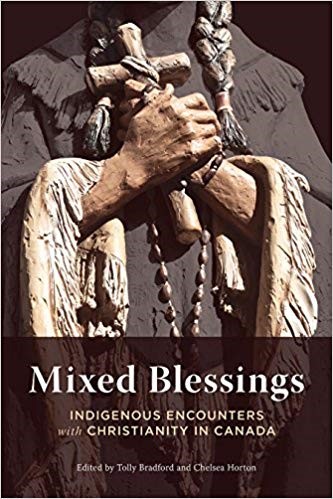Search Phrase = gatherings
Keywords: regional, gatherings
Regional gatherings
Please check back for future regional gatherings.
Keywords: Bartomole de las Casas, Indigenous spirituality, Truth and Reconciliation Commission, Residential Schools, mission
Bartomole de las Casas, Indigenous spirituality, Truth and Reconciliation Commission, Residential Schools, mission
If one finds some gold nuggets in a pile of manure, does it make the pile less stinky? No, but it does prove that the pile is not composed of 100% pure manure and it would certainly encourage the finder to sift through the pile with greater interest. Perhaps the analogy is a bit crass, but the history of Christian mission to Canada's Indigenous peoples has come to be largely viewed with disgust, particularly in light of the findings of the Truth and Reconciliation Commission. To look for and highlight positive examples of humble, culture-affirming, advocates for the shalom of Indigenous peoples is to tread on sensitive ground when the scars of colonialism are so deep and the wounds still so fresh.
In 2015, Canada's Truth and Reconciliation Commission concluded a six year process of listening to the stories of First Nations, Inuit and Métis peoples. More than 6000 witnesses shared their personal experiences at listening sessions set up all across the country. Their stories primarily recounted experiences of abuse and ethnocide through more than 100 years of Residential Schools, which operated in a cooperative effort between churches and the government of Canada. Indigenous children were often forcefully removed from their homes and relocated to these schools where they were given European names, haircuts, and clothing, forbidden to speak their languages, and immersed in a western and overtly Christian education system. The plan was to turn them into productive, assimilated citizens who would bring an end to "the Indian problem." Many suffered physical, psychological, sexual abuse and neglect. The trauma suffered by these children and their successive generations left a legacy of addiction and substance abuse, poverty, broken families, and much higher suicide and incarceration rates than the rest of the Canadian population. It is unquestionably a dark and regrettable period of Canadian history.
When Senator Lynn Beyak suggested that "positive aspects of residential schools have not been acknowledged" there was a massive outcry across the nation that led to her suspension from the Senate. Indigenous Affairs Minister Carolyn Bennett replied that "the entire purpose of the residential schools was wrong." Indeed, while there may have been examples of good, compassionate teachers in these schools the overall legacy has been decidedly damaging.
It would be in no one's interest to try to sanitize the history of a missionary strategy that so blatantly violated the ethos of mission in the way of Jes us. At the same time, one need not affirm that the entire purpose of Christian mission to Indigenous peoples was evil. Mission was often a partner to colonial interests and many missionaries shared the biases and ethnocentric attitudes of their cultural peers. Yet, there are stories of men and women who rose above their natural prejudices and embraced the radical way of Jesus by offering an incarnational witness that made the Gospel compelling. A compendium of essays, recently published by the University of British Columbia, is entitled "Mixed Blessings: Indigenous Encounters with Christianity in Canada." Rather than paint a binary picture of white colonizer/abuser versus Indigenous victim, the scholars explore the nuanced dynamics of Indigenous agency and how Christianity had and continues to have, real meaning for many Indigenous people. The contributors argue that Indigenous peoples embraced Christianity for political as well as spiritual reasons, with many finding an affinity between their traditional spirituality and the spirituality demonstrated by missionaries. This is obvious every July when nearly 40,000 mostly Indigenous people flock to the pilgrimage site of Lac St. Anne, in Alberta, (a shrine founded by Oblate missionaries) for five days of special mass, prayers, blessings and family gatherings. Despite their flaws and cultural captivity, some missionaries offered a compelling and sacrificial witness of laying down their lives out of love for Indigenous peoples. These stories must be told and celebrated, for they round out and provide a fuller picture of our mostly troublesome past.
us. At the same time, one need not affirm that the entire purpose of Christian mission to Indigenous peoples was evil. Mission was often a partner to colonial interests and many missionaries shared the biases and ethnocentric attitudes of their cultural peers. Yet, there are stories of men and women who rose above their natural prejudices and embraced the radical way of Jesus by offering an incarnational witness that made the Gospel compelling. A compendium of essays, recently published by the University of British Columbia, is entitled "Mixed Blessings: Indigenous Encounters with Christianity in Canada." Rather than paint a binary picture of white colonizer/abuser versus Indigenous victim, the scholars explore the nuanced dynamics of Indigenous agency and how Christianity had and continues to have, real meaning for many Indigenous people. The contributors argue that Indigenous peoples embraced Christianity for political as well as spiritual reasons, with many finding an affinity between their traditional spirituality and the spirituality demonstrated by missionaries. This is obvious every July when nearly 40,000 mostly Indigenous people flock to the pilgrimage site of Lac St. Anne, in Alberta, (a shrine founded by Oblate missionaries) for five days of special mass, prayers, blessings and family gatherings. Despite their flaws and cultural captivity, some missionaries offered a compelling and sacrificial witness of laying down their lives out of love for Indigenous peoples. These stories must be told and celebrated, for they round out and provide a fuller picture of our mostly troublesome past.
There are probably limits to this analogy, but I would propose that looking for heroic figures that defied the status quo during the Holocaust and risked their lives for the cause of justice and compassion, does not in any way diminish the horror or stench of that unspeakable period of history. Even while the French Reformed Church chose to remain silent and unopposed to the German occupation of France, we admire the likes of André and Magda Trocmé who mobilized the entire village of Le Chambon sur Lignon to spare more than 3,000 Jews from death. And while the majority of German churches endorsed Hitler's rise to power, Martin Niemöller became the leading voice of resistance for the Confessing Church. Yet, even these "golden nuggets" were flawed agents who struggled to discern the true essence of the Gospel while in the vice-grip of their powerful cultural milieu. During most of his ministry Niemöller maintained a strong commitment to nationalism and militarism. Only after the war did he come to a more refined understanding of the nature of mission in the way of Jesus.

Missionaries, like all humans, are inescapably shaped by their fallen cultures of origin. Their motives and methods are often a mixture of noble and evil. Bartolomé de las Casas, often lauded for his fifty years of advocacy for Indigenous rights, once owned Indigenous slaves himself and even supported the African slave trade to replace the forced labor imposed on Indigenous peoples in the West Indies. Only later in life did he come to see all forms of slavery as inconsistent with his Christian faith. Despite his inconsistencies, we uphold him today as an example of conscience and prophetic witness during an era characterized largely by collusion between mission and colonial power.
Finding golden nuggets in the manure pile brings hope into the historical narrative, reminding us that humans are capable of transformation and of breaking out of their cultural prison. It reignites confidence that glimpses of the missio Dei can be sighted in the flawed and sometimes smelly efforts of human agents.